Vladimir Igorevich Bogachev, doctor of physical and mathematical sciences and professor at Moscow State Lomonosov University, spoke about science, faith and leading scientists who became confessors of Orthodoxy in the 20th century: petroleum scientist V.N. Shchelkachev, mathematicians D.F. Yegorov and N.N. Luzin, and geologist and secret priest Gleb Kaleda.
* * *
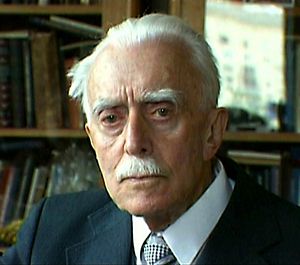 Doctor of petroleum science Vladimir Nikolaevich Shchelkachev.
Doctor of petroleum science Vladimir Nikolaevich Shchelkachev.
—Indeed, I knew Vladimir Nikolaevich Shchelkachev for about a quarter century. I can even say that we are relatives: his son is our son's godfather, and spiritual ties are stronger than blood relations.
Vladimir Nikolaevich Shchelkachev was an exceptionally interesting person. He lived a long life, almost a century: he was born in 1907 and died in 2005, not quite living to one hundred. Recently the publishing house The Oil Industry published The Road to the Truth. I recommend it to everyone, although I think it might be hard to find.
Shchelkachev's personal recollections make up most of the book. I cannot, of course, retell them briefly, but some running themes are the relationship of science and faith and the search for one's own path in life. These are eternal questions and a century ago they were just as essential as they are today.
Vladimir Nikolaevich describes how he and some of his contemporaries answered those questions for themselves. And I should also point out that at the time all of this was even more dramatic.
Born in 1907, his teens and twenties—the age when a person starts to give “eternal questions” some thought—came during the post-revolutionary period: the Russian Civil War and the years immediately following.
Keep in mind that Shchelkachev's father was a military officer in the Imperial Army, a colonel, and was placed under arrest several times under the new regime. He was released and then arrested again, let go another time and later picked up once more. He lived twenty-five years past the Revolution and spent almost all of that time in the camps and in exile.
Vladimir Nikolaevich met secretly with his father a few times when the latter, while in exile, worked on one of the enormous construction projects where it was possible for an outsider to get inside. But all the same he did not go free.
Thus Vladimir Nikolaevich was brought up for the most part by his mother. He finished school early, at age 15, and went to Moscow for his higher education. He grew up in a believing family and suddenly encountered new propaganda that was diametrically opposed to what he had assimilated at home.
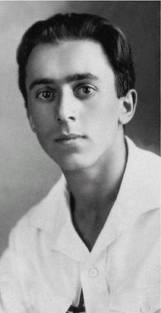 A young V. N. Shchelkachev.
A young V. N. Shchelkachev.
His mother answered wisely. She did not try to persuade him but said something like this, “from your childhood you were brought up to hold certain beliefs, and suddenly you encountered other views and started to doubt. If you are a well-grounded person, then you must, of course, come to your own conclusions based not on superficial, emotional impressions, but after having seriously considered, weighed everything, and decided for yourself. Go back to Moscow, go to the library and read what supporters of one side say, and supporters of the other. Then make your choice and tell me what you decided. And I will respect you as a person who made a conscious decision, even if I do not personally agree with what you choose.”
And that is what Vladimir Nikolaevich did. He went back to Moscow and started reading. He approached the task methodically, like a math problem.
He gained access to a restricted area of the library. In the 1920s a part of the collection was quickly reclassified into the “restricted use” category, but professors could still give students permission to access books from there. Soon that would no longer be possible, but Vladimir Nikolaevich was able to read the works of certain philosophers, as well as a great deal of Soviet agitational literature.
He read and compared. This reading and comparing made a profound impression on him. He made a truly conscious decision.
He understood that faith is not adherence to certain rituals or a family's cultural tradition. Faith is actually a question one can solve for oneself rationally, like a scientific theory.
—And not so much validate faith itself as demonstrate the fallacy of refuting it?
—That too, but in a wider sense: one's views can be validated like scientific facts. This does not mean that they can be deduced logically—it would be absurd to think that questions of faith could be proven logically, scientifically.
Even in the most formalized science, mathematics, the simplest things are often unprovable; for instance, in arithmetic, which has to do with natural numbers. It has been proven that there are certain equations, concerning which it is not possible to determine whether they are solvable. This seems paradoxical: when the equations are written out it seems obvious—they are either solvable or not. And this is true, but it cannot be proven arithmetically.
—Gödel's incompleteness theorem?
—Yes. This is a very interesting phenomenon. And if this happens with fundamental things, then it is absurd to assume that more cardinal things can be proven or refuted scientifically.
—Yes but Gödel's theorem holds that any axiomatic theory is either paradoxical or incomplete. In this sense it is possible, at the very least, to say that if contradictory evidence lies at the basis of any dogmatic system—like the Catholics have, for instance—then in aggregate the dogmatic theory itself becomes uninteresting, because you can deduce anything you want from this theory. Can this theorem be used in the same way?
—I think that on a philosophical level one can come to a different conclusion—that the evidence itself is not contained within the sphere of formal or “mechanically verifiable” relationships. These are facts, which have been borne out through immense experience; and this is the sense in which phenomena in spiritual life can be compared to science, which is just what Vladimir Nikolaevich Shchelkachev did.
There are facts; therefore there is a certain empiricism that can be subjected to verification.
Personal truths are not axioms or theorems which are deduced from somewhere. It is empirical science. Vladimir Nikolaevich grasped this science and was lucky that in his very long life he did not become disappointed in his beliefs.
He performed another interesting task: he collected the sayings of famous scientists about faith.
It turns out that there are eminent scientists who are believers and equally prominent scientists who are not believers. A hundred years ago a study was conducted.
—Tabrum's survey?
—Yes, the Englishman Arthur Tabrum[1] sent around 200 surveys to the leading scientists of his time and received answers from most of them—about 150. A very large percentage of them were believers.
If a similar experiment were conducted today, then the percentage would most likely be smaller. But what would that prove? I think it would prove nothing.
There is no basis for thinking that the way chemists or physicists working in their narrow fields and having achieved incredible heights see the world is more authoritative than the way other people do. There's just no way to agree with that.
Naturally, if one thinks about what kind of people we look to today in the mass media—athletes, actors, and singers—then an appeal to scientists deserves even more attention. Nonetheless, it seems to me that it is incorrect to think that some statistic or other in a certain category of people provides any definitive answer to this question.
In terms of faith all people are equal, regardless of what they do and how great their achievement.
By the way, speaking of statistics. If you look at how many truly Orthodox, church-going people there are today in Russia, then the number is quite small. But that has pretty much always been true. And that will be the case in the future, too.
Even before the Revolution, among scientists, especially in Russia, the percentage of non-churchgoing people grew, although there were profoundly religious people as well—Mendeleyev for instance. And among mathematicians there is Yegorov, who taught Vladimir Nikolaevich Shchelkachev.
Dmitrii Fedorovich Yegorov
—Could you tell us a little about Yegorov[2] and Luzin,[3] about the debt owed them by Moscow University and the entire Moscow school of mathematics?
—Yegorov was an old professor from before the Revolution. He was educated in Russia. Then, as was customary, he went to France and Germany. He spoke several foreign languages well and personally knew many leading European scholars, attended their lectures, and conversed with them. Back in Moscow Yegorov became one of the founders of the contemporary approach to working with students, which in addition to required subjects includes special courses and seminars that prepare students to give papers and conduct research.
One of Yegorov's principal achievements was establishing the system of education in Russia. He had personal academic achievements. For instance, one of his theorems is included in the university curriculum; but, I repeat, I see his main role as the organizer of a new type of education for Russia.
Luzin was one of the best-known students of Yegorov, who had many remarkable students, including Petrovsky, the outstanding rector of Moscow University. Luzin became a professor just before the Revolution. Interestingly, he received his doctorate for his master's dissertation in view of its outstanding significance.
Anyway, Luzin was Yegorov's student and adopted many traditions from him. In their turn, many of Luzin's students were celebrated in their own right.
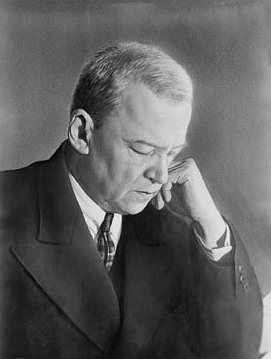 Nicholai Nicholeyevic Luzin.
Nicholai Nicholeyevic Luzin.
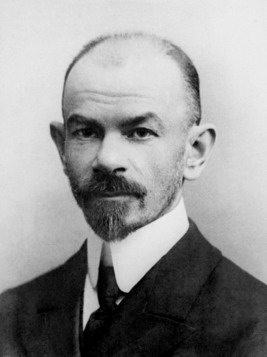 Dmitrii Fedorovich Yegorov.
Dmitrii Fedorovich Yegorov.
—Yes, “the tree of Luzin”—his students and the students of his students...
If you look at the people included on this tree, you'll find the majority of contemporary Russian mathematicians. There are scholars who have different roots, naturally, but without a doubt most can trace their lineage back to Yegorov and Luzin. And thus the blossoming of the mathematical sciences in Russia that took place in the 1930s, and the leading position they hold even to this day, was in large part the work of Yegorov and Luzin.
—And they were both believers.
—Yes, and Yegorov suffered for his faith. He never hid his views, even during the difficult years of persecution.
In what sense did he not hide them? He was a fairly introverted person, he never proselytized; he believed that faith was a personal choice, but he never tried to cover up his beliefs.
Right up to his death he was President of the Moscow Society of Mathematics. In the 1920s there was full-on repression on all sides, and he would stand up during a meeting and announce that so-an-so had been arrested, that their family was in dire straits, let's chip in to help them.
For a while he got away with it. Then in 1930 the anti-church case was fabricated.
This was a series of blows against the Orthodox Church. A few years before, there was an attempt to create a kind of alternative church,[4] and when it fell apart, and it became clear that most believers would not be deterred by this, the project was abandoned, and new types of pressure were brought to bear—the fabrication of cases.
And Yegorov was caught up along with a whole group of well-known professors in one of those cases. Vladimir Nikolaevich Shchelkachev, too, was arrested in this case, although he was very young at the time, only 22. He spent several months in prison as a cell-mate with Yegorov.
His reminiscences of this experience are very interesting, but cannot be conveyed in a few words.
Yegorov was sent into exile, but his health was compromised, which prison exacerbated. He died soon after arriving in Kazan.
A first Shchelkachev was sent to a camp, but after much petitioning the powers-that-be, his sister managed to lessen his sentence a bit; his exile was substituted for prison camp. Shchelkachev spent many years exiled from Moscow. Only after the war, I think, was he able to come back.
Because of these periods of exile, because he was torn away from mathematics, he had to master another profession. He got involved with the petroleum industry, and this became his life's work. Shchelkachev became a leading specialist in oil extraction not only in Russia, but worldwide. Although he worked on Russian deposits, he thoroughly explored oil development in America.
—Theoretically?
—In what sense theoretically? He worked on theoretical problems including equations for estimating well pressure, but he also thoroughly analyzed deposits in America and was one of the leading Russian experts on American oil production. And of course he studied this not just for theoretical purposes.
From the end of the 1930 to the end of the 1970s he participated in the development of some of the largest oil deposits. Even in the last years of his life he was consulted; he was a leading specialist. He received many government decorations. In the early 1950s he even won the Stalin Prize, first degree.
—Did people around Vladimir Nikolaevich perceive him as a religious believer?
—Many people knew that he was a believer, but not everyone, because he did not, as we would say these days, proselytize. But nobody who found out was surprised: his appearance and demeanor made it easy to guess that he was a Christian.
At that time people did not typically broadcast their convictions. Till the start of the 1960s the Soviet intelligentsia was extremely atheistic, moving ever farther away from faith. Then the reverse process began; and strange as it may seem, it occurred not among those in the humanities but among the “technical” intelligentsia: physicists, mathematicians, and engineers.
Many came to the faith as adults; as did I, for instance. It happened when I was about twenty—when I met Vladimir Nikolaevich.
Over the course of his entire life he preached Christian values. Perhaps he did not call things by their real names. Obviously, in the Soviet era the undisguised propagation of Christianity would not have been allowed. But if we read his speeches at meetings and conferences, and the brochures he published, there is nothing you would want to cross out. Everything he said and wrote then is applicable to today. I don't think there are very many statements made in the Soviet era—both on scientific topics and on matters of conscience—that would not make their authors blush today.
—How did you meet?
—Through his son, who has long been a priest,[5].[6] He wrote a doctoral dissertation, but then decided to become a priest before he defended it. He could have passed his defense, but chose a new field for himself instead. but was then still a physicist. For a long while he was a theoretical physicist, a student of Bogoliubov
Even back then, in the 70s, he was exploring the new history of the Russian Orthodox Church, especially the events of the Church Council of 1918 with the election of a Patriarch and what then followed. We met through this research: he gave a very interesting paper. Of course, at the time, this kind of research could not be shared publicly. It all happened in the homes of students.
What was the official reaction at the University if one of the professors or students was discovered going to church? Was there any easing of the policy against religion in the early 1980s?
—There was no easing. Even at the start of perestroika, when party bureaucrats started selling off state property, it became possible to travel abroad, and it was clear that everything was falling apart, there was no loosening up when it came to matters of religion. Up to the very last days of the USSR repression of the Church continued by inertia.
People could still be not recommended for graduate study because they were believers. Or, someone could be barred entry somewhere, if something like that were still possible. That's how it was in the mid 80s, and I think even in the late 80s.
In any case, when the thousand years of Russian Christianity was celebrated, it was perceived as an unbelievable concession. If we look at it from today's perspective, one might wonder what was the big deal? The authorities merely allowed the celebration of an historical event and that's all. There was certainly no continuation, no thaw with regard to the Church.
This was in 1988, when party bureaucrats charged with overseeing that kind of thing were occupied with entirely different issues, like the furious privatization of formerly nationalized property. Nonetheless, there was no lessening of the repression.
Everything changed beginning in 1990-1991: churches were opened up, Sunday school was allowed.
Of course, it cannot be said that there was persecution until that time—there's no comparison with what happened in the 1930s, but there was definitely pressure.
But—I want to repeat one more time—Although Vladimir Nikolaevich Shchelkachev was never a member of any sort of opposition and never distributed illegal materials, he nevertheless witnessed the Christian faith throughout his scientific and pedagogical careers.
—It's as if he quietly preached by how he lived his life and through his relationship to people?
—I would not say quietly, but without high-sounding words. Clearly, though. Yes! Not just through how he lived but also by the way he sincerely stated his views on how to bring up youth. And his example for us here is perhaps not so easy to follow.
He spoke quite a bit about his teachers, primarily about Yegorov, Luzin and Leibenzon. He wasn't just interested in mathematics, but also music and other subjects. He had many interesting contacts with totally different people. Wherever he worked, he always organized something: additional lessons, clubs... Wherever he was, be it Grozny, Alma-Ata, other places, he is still remembered.
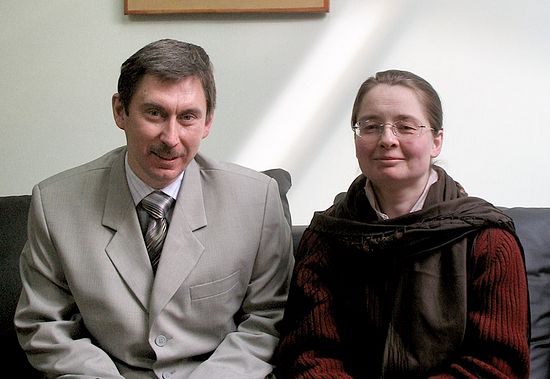 Vladimir Igorevich Bogachev and his wife Anna Nikolaevna. Photo: A. Pospelov/Pravoslavie.ru
Vladimir Igorevich Bogachev and his wife Anna Nikolaevna. Photo: A. Pospelov/Pravoslavie.ru
Anna Nikolaevna Bogacheva:[7] Allow me.
—Of course.
—He could teach even if he wasn't saying anything. He taught just with his face. It's hard to convey in words. People said he looked like a general from the ancien regime: tall and straight. This is by no means a complete portrait, but what is true about it is that he really saw himself marching right along with everyone else. He served the truth, not just in his work, but the Truth in general. You could see that in him. Such a man, with his clear self-direction and dedication to his goal, so obviously practiced what he preached.
Perhaps living alongside someone like that was sometimes difficult. A person with a goal can often move ahead like a tank. Being close to someone like that can be hard.
—Did you know him for a long time?
—For the same amount of time that Vladimir Igorevich did—almost twenty-five years. I was friends with his son's wife, and still am. They often had us over to visit. I got to know him in an informal setting. Of course, I never had any private conversations with Vladimir Nikolaevich, because of the generational difference between us, but his example meant a lot to me.
—As a person from the period before the Revolution?
—He was not just a figure of the pre-Revolutionary period, but a timeless figure. He was example of a committed Christian—an image that has not changed since the age of the apostles. And Vladimir Igorevich was like an apostle.
—You surely knew others like him?
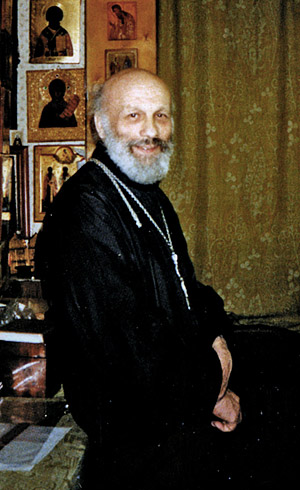 Archpriest Gleb Kaleda.
Archpriest Gleb Kaleda.
Now there was a man! He survived the war at the front, became a scientist, an eminent geologist. He went on many geological expeditions all over the USSR. He was widely published; had a doctorate. And then he was made a priest.
At the time the Church was in great danger. Some prominent bishops understood that ordaining someone in the open was sometimes impossible: either the authorities would not approve the candidate, or the person would be under their control; and so they ordained in secret.
Father Gleb Kaleda was one of those secretly-ordained priests. I think he was a secret priest for about fifteen years. Very few people knew his secret. He always served the Liturgy at home.
Then when things changed he started to serve openly with the blessing of Patriarch Alexiy II.
Father Gleb also was also very involved with questions of science and faith. He was especially interested in the Shroud of Turin. He collected information about it and even published a very interesting brochure. I think everyone who is curious about the Shroud should definitely read it. It presents in a vivid, concise way the principle findings on the Shroud and the various scientific hypotheses about it. It's very interesting reading.
Both in his published writings and his sermons, Father Gleb spoke on the same topics as Vladimir Nikolaevich: the correlation between science and faith. Clearly people like this preached in conjunction with the example they set.
Incidentally, I discovered the words of Shchelkachev while leafing through Father Gleb's book about the Shroud of Turin: “True faith is similar to science. For what is science? It is the accumulation of knowledge based on observation, experience and inference. And what is religious faith? Religious faith is the conviction also based on observation, experience and inference.” These words are so typical of him. I think that he proved this viewpoint his whole life long by how he lived.
